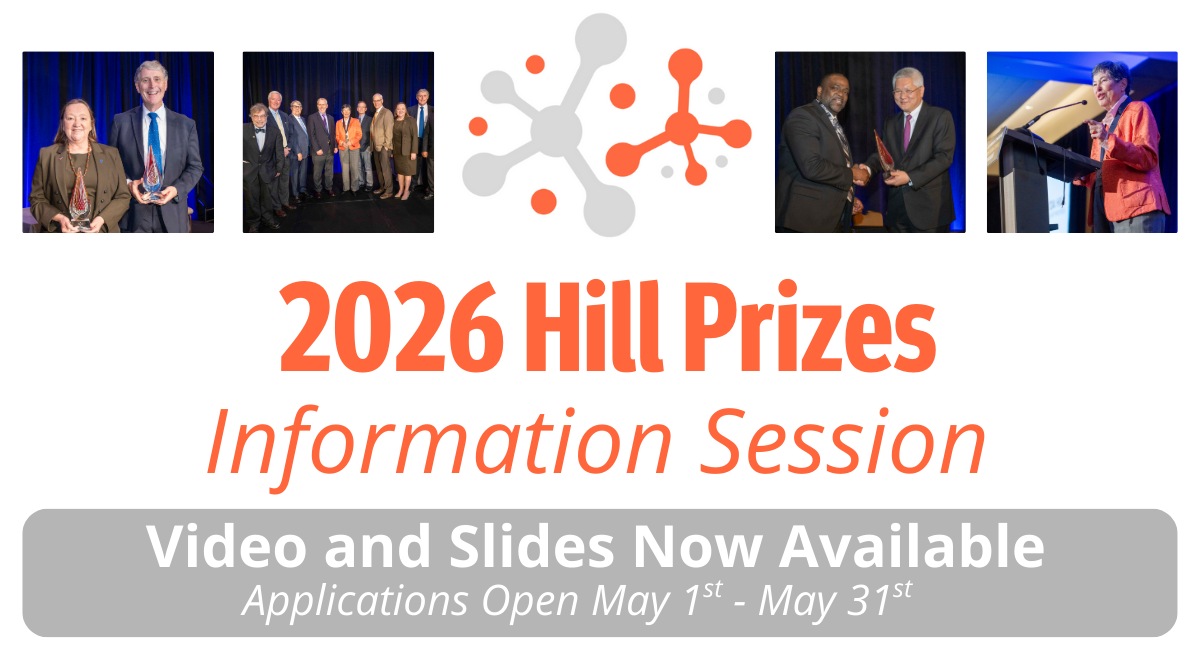Hill Prizes Information Session Slides and Video Available

TAMEST held an Information Session for the 2026 Hill Prizes on Tuesday, April 15, to provide an overview of the prizes, application process and selection criteria. Slides and a video of the session are now available. Applications are now open and will be accepted from May 1 – 31, 2025.
The Hill Prizes, funded by Lyda Hill Philanthropies, propel high-risk, high-reward ideas and innovations that demonstrate significant potential for real-world impact and can lead to new, paradigm-shifting paths in research.
“We’re not interested in funding something that has already been done, we want an idea that is unique,” said 2026 Hill Prizes Committee Chair David E. Daniel, Ph.D. (NAE), who hosted the session. “I wouldn’t say it has to be so unique that nobody has ever worked on it before, but it does need to be a novel pathway forward. What we are looking for is not necessarily a firm, fixed pathway, but a reasonable expectation that if the idea works out and the research validates it, that this can get out to the real world.”
The 2026 Hill Prizes have six categories: medicine, public health, engineering, biological sciences, physical sciences and technology. The medicine, public health, engineering, biological sciences and physical sciences prizes will be given to researchers and teams at academic and medical institutions. The Hill Prize in Technology will be given to individuals and teams in the private sector and government in applied sciences and engineering.
The Hill Prize in Public Health was recently added last year, and the Hill Prize in Public Health Subcommittee Chair and TAMEST Member Ellen Gritz, Ph.D. (NAM), joined the session to give some insight on what they are looking for with the new prize category.
“One of the reasons this new prize [in public health] was created was to be able to embrace the broad span of research that falls under behavioral science and public health,” said Dr. Gritz. “So, while we are interested and aiming to target an entire population, there are human behaviors that are involved in targeting preventative health and public health. For example, any kind of substance use, smoking cessation, alcohol, dietary, physical activity or cancer survivorship – these would involve public health techniques that are aimed at groups of individuals. I would not suggest submitting those to the medicine category, because even though they involve individuals, they are part of the realm of public health.”
Each prize recipient’s institution or organization will receive $500,000 in direct funding from Lyda Hill Philanthropies to accelerate their work. Prize recipients will be announced in January 2026 and recognized on February 2, 2026, at the opening reception of the TAMEST 2026 Annual Conference in San Antonio, Texas.
“This is really important… [your application must include] what you are trying to solve, what is the limitation of the current approach, potential for impact and path to impact for your proposal,” said Dr. Daniel. “I want to emphasize that a successful proposal will not look like most NSF or NIH proposals… that’s not what this is about, it’s a different kind of proposal.”
The prizes are open to all Texas-based applicants (including TAMEST members) 15 years or more after their first independent faculty, government or industry-affiliated appointment.
For more information on the prizes, please read the Frequently Asked Questions page and view the Hill Prizes Application Guide.

